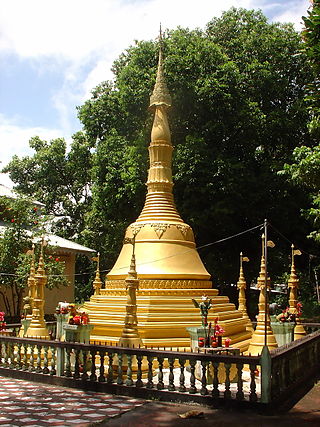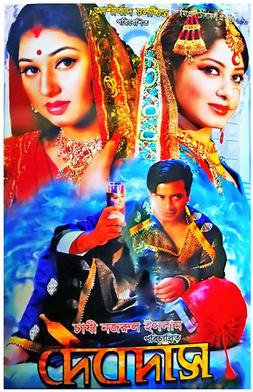Related Research Articles

Bimal Roy was an Indian film director. He is particularly noted for his realistic and socialistic films such as Do Bigha Zamin, Parineeta, Biraj Bahu, Devdas, Madhumati, Sujata, Parakh and Bandini, making him an important director of Hindi cinema. Inspired by Italian neo-realistic cinema, he made Do Bigha Zamin after watching Vittorio De Sica's Bicycle Thieves (1948). His work is particularly known for his mise en scène which he employed to portray realism. He won a number of awards throughout his career, including eleven Filmfare Awards, two National Film Awards, and the International Prize of the Cannes Film Festival. Madhumati won 9 Filmfare Awards in 1958, a record held for 37 years.

Buddhism is the third-largest religious affiliation and formed about 0.63% of the population of Bangladesh. It is said that Buddha once in his life came to this region of East Bengal to spread his teachings and he was successful in converting the local people to Buddhism, specially in the Chittagong division and later on Pala empire propagate and patronized Buddhist religion throughout the Bengal territory. About 1 million people in Bangladesh adhere to the Theravada school of Buddhism. Over 65% of the Buddhist population is concentrated in the Chittagong Hill Tracts region, where it is the predominant faith of the Rakhine, Chakma, Marma, Tanchangya, other Jumma people and the Barua. The remaining 35% are Bengali Buddhists. Buddhist communities are present in the urban centers of Bangladesh, particularly Chittagong and Dhaka.

Pramathesh Chandra Barua was an Indian actor, director, and screenwriter of Indian films in the pre-independence era, born in Gauripur, Dhubri, Assam.

Jamuna Barua was a leading Indian actress.

Devdas is a 2002 Indian Hindi-language period romantic drama film directed by Sanjay Leela Bhansali and produced by Bharat Shah under his banner, Mega Bollywood. It stars Shah Rukh Khan, Aishwarya Rai and Madhuri Dixit in lead roles, with Jackie Shroff, Kirron Kher, Smita Jaykar, and Vijayendra Ghatge in supporting roles. Based on the 1917 novel of the same name by Sarat Chandra Chattopadhyay, the film narrates the story of Devdas Mukherjee (Khan), a wealthy law graduate who returns from London to marry his childhood friend, Parvati "Paro" (Rai). However, the rejection of their marriage by his own family sparks his descent into alcoholism, ultimately leading to his emotional deterioration and him seeking refuge with the golden-hearted courtesan Chandramukhi (Dixit).

Devdas is a 1955 Indian Hindi-language period drama film directed by Bimal Roy, based on the Sarat Chandra Chattopadhyay novel Devdas. It starred Dilip Kumar in the titular role, Suchitra Sen in her Bollywood debut as Parvati "Paro", Vyjayanthimala in her first dramatic role where she played courtesan named Chandramukhi. Motilal, Nazir Hussain, Murad, Pratima Devi, Iftekhar, Shivraj were playing other significant roles along with Pran, Johnny Walker in extended cameo appearances.

Devdas is a 1935 Bengali film directed by Pramathesh Barua and based on the Sharat Chandra Chattopadhyay novel, Devdas. It stars Barua himself as Devdas and Jamuna Barua as Parvati (Paro) and Chandrabati Devi as Chandramukhi. This was Barua's first of three language versions of the story, the second being in Hindi and the third in Assamese. The Bengali film was dubbed into Tamil and released in 1936. K. L. Saigal sang two songs in Tamil for this film.(See Ext. links for a link.)
Devdas is a Bengali novel by Sarat Chandra Chattopadhyay, first published in 1917 and adapted as a film many times.

Devdas is a 1936 Hindi-language Indian drama romance film based on the Sharat Chandra Chattopadhyay novella, Devdas. Directed by Pramathesh Barua, it stars K.L. Saigal as Devdas, Jamuna Barua as Parvati (Paro) and Rajkumari as Chandramukhi. This was Barua's second of three language versions, the first being in Bengali and the third in Assamese.

Assamese cinema, is an Indian film industry of Assamese-language. It is based in Assam, India. The industry was born in 1935 when Jyoti Prasad Agarwala released his movie Joymoti. Since then the Assamese cinema has developed a slow-paced, sensitive style, especially with the movies of Bhabendra Nath Saikia and Jahnu Barua. In beginning the industry were called Jollywood, named for Agarwala's Jyoti Chitraban Film Studio.

The Barua, are an ethnic group native to Chittagong Division in Bangladesh, Rakhine State in Myanmar, where they are known as the Maramagyi or Maramagri, and parts of Assam, West Bengal and Tripura in northeast India. According to Arakanese chronology, the Barua Buddhists have lived there for five thousand years. Another derivation of 'Barua' is 'Baru' and 'Arya' meaning great arya. They are commonly identified by their last name, "Barua". Barua is derived from "Baru" meaning "great" and "ua", meaning "noble rulers". In Myanmar, the Barua is classified as one of the seven groups that make up the Rakhine nation. Originally, the Barua title is of Assamese origin.
Devdas is a 1937 Assamese film based on the Sharat Chandra Chattopadhyay novella, Devdas. Directed by Pramathesh Barua, it stars Phani Sarma as Devdas, Mohini as Chandramukhi, and Zubeida as Paro. The songs were playbacked by Shamshad Begum and Bhupen Hazarika. This was Barua's last of three language versions, the first being in Bengali and the second in Hindi.

Pratima Barua Pandey was an Indian folk singer from the royal family of Gauripur in Western Assam's Dhubri district. Barua Pandey, a national awardee, best known for her Goalpariya songs Hastir Kanya and Mur Mahut Bandhure, was the daughter of Prakritish Chandra Barua (Lalji) and niece of filmmaker Pramathesh Barua of Devdas fame.

Khandaker Nurul Alam was a Bangladeshi music composer and singer. He won Bangladesh National Film Award for Best Music Director for the films Chandranath (1984), Shuvoda (1986), and Padma Meghna Jamuna (1991). He was awarded Ekushey Padak in 2008 by the Government of Bangladesh for his contribution to Bangladeshi music.

Devdas is a Bangladeshi Bengali romantic film based on the Sharat Chandra Chattopadhyay novel Devdas. It is the second Bangladeshi and fifth Bengali version of the story. It was directed by Chashi Nazrul Islam, who also directed the 1982 version, and stars Shakib Khan as Devdas, alongside Moushumi and Apu Biswas in the leading roles.

Birendranath Sircar was an Indian film producer and the founder of New Theatres Calcutta. He made Bengali-language films that were noted for introducing many film directors who later became famous. He was awarded the Dada Saheb Phalke Award in 1970 and the third highest civilian award in India, the Padma Bhushan, in 1972.
Phani Majumdar was a pioneering Indian film director, who worked in Hindi cinema, most known for his film Street Singer (1938) starring K.L. Saigal noted for its song, Babul Mora Naihar Chhooto Jaye, Meena Kumari classic Aarti (1962) and Oonche Log (1965). He also worked in Singapore, where he notably made Hang Tuah (1955) in Malay, which was nominated for the Golden Bear at the 7th Berlin International Film Festival.

A. K. M. Abdur Rouf was the founder-curator of Bangladesh Film Archive (BFA). He was awarded Ekushey Padak in 2010 for his contribution to arts and Independence Day Award in 2016 in recognition of his outstanding contributions to the nation by the Government of Bangladesh.
The 33rd International Film Festival of India was held from 1–10 October 2002 in New Delhi. The competitive edition was restricted to "Asian Directors". Deepak Sandhu served as the director for the festival. The Devdas retrospective received special mention. From this edition, the "Film Bazaar" was instituted.
References
- 1 2 Hayat, Anupam. "Film Archive". Banglapedia. Retrieved 29 October 2016.
- ↑ "Bangladesh Film Archive moves to new building". The Daily Star. 3 July 2008. Retrieved 29 October 2016.
- ↑ "Bangla to gift India print of Barua's Bengali 'Devdas'". The Times of India. Retrieved 29 October 2016.